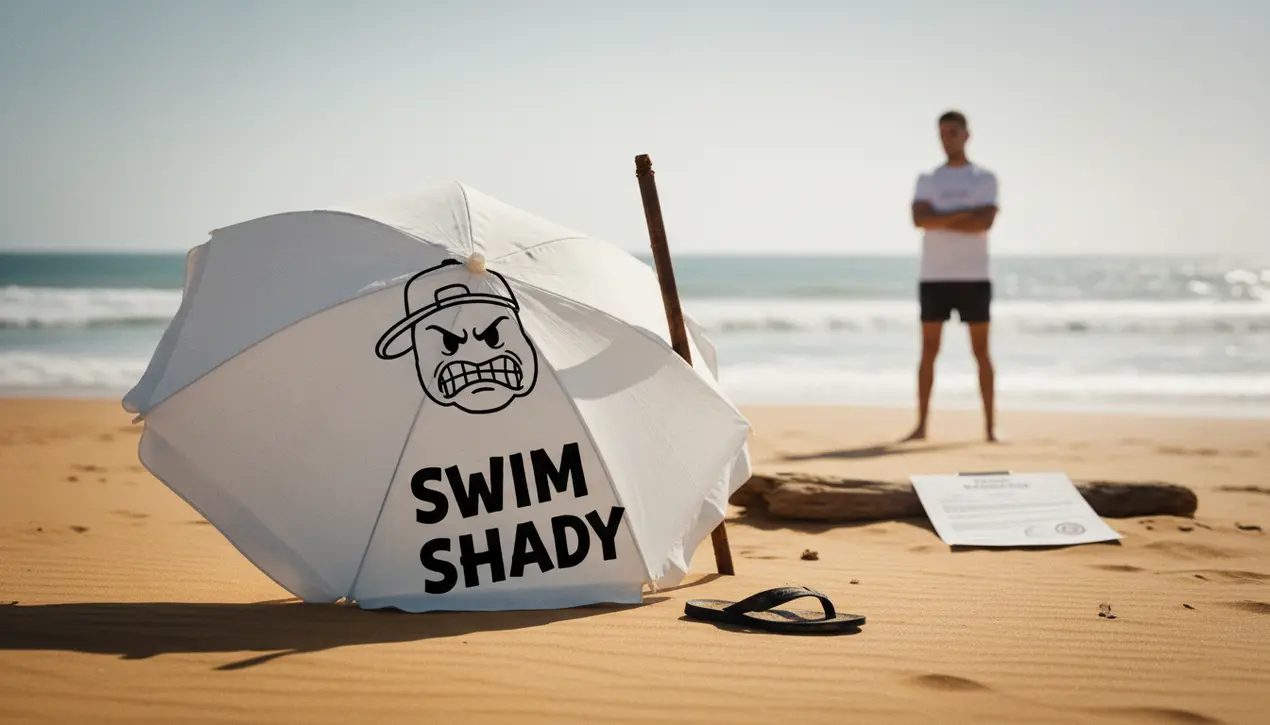
Entertainmentcelebrities
Eminem Seeks to Cancel 'Swim Shady' Beach Umbrella Trademark
BR
Brian Miller
2 hours ago7 min read
In a move that feels ripped from a diss track’s playbook, the legal battleground has shifted from the booth to the trademark office as Marshall Mathers, the lyrical titan known to the world as Eminem, has set his sights on an Australian beach accessory company attempting to trademark the name 'Swim Shady'. This isn't just a casual cease-and-desist; it's a full-blown legal opus, a symphony of intellectual property law conducted by the rapper's attorneys who argue the pun is a direct and impermissible echo of his own iconic stage name, a brand he has meticulously protected since its ascent in the late 1990s.The core of the argument rests on the doctrine of likelihood of confusion—a legal concept as crucial in trademark law as a killer hook is in a hit single. Eminem’s legal team, likely operating from a deep playbook of precedent, will contend that consumers encountering a 'Swim Shady' umbrella might naturally, if erroneously, assume the product is endorsed by or connected to the real Slim Shady, capitalizing on the decades of goodwill and cultural capital he has built.This is more than just about a name; it's about the very essence of brand identity in the modern marketplace, where a clever pun can blur the lines between homage and infringement. We’ve seen this narrative before in the music industry, from Pharrell Williams and Robin Thicke's 'Blurred Lines' copyright case to the ongoing battles over artist samples, but trademark disputes like this cut to the heart of an artist's commercial empire.For an artist of Eminem’s stature, whose name is synonymous with a specific, gritty, and uncompromising artistic vision, the dilution of that brand through unrelated, leisure-focused products represents a tangible threat. Imagine the cognitive dissonance: the same name attached to both a rap god who chronicled the struggles of Detroit and a cheerful umbrella meant for a sunny day at Bondi Beach.The Australian company, for its part, might argue for parody or fair use, suggesting the name is a simple, humorous play on words too absurd to cause genuine confusion, a lighthearted nod rather than a malicious grab. Yet, courts have often sided with established, famous marks, recognizing that their very fame makes them more vulnerable to dilution, even in unrelated fields.The outcome of this case could hinge on nuanced factors: the visual and phonetic similarity, the intent of the Australian applicants, and the channels of trade through which the product is sold. A deeper look reveals this is part of a much broader pattern for Eminem and his holding company, Eight Mile Style, which has aggressively policed his trademarks against everything from video games to opposition politicians, demonstrating a fierce, almost obsessive commitment to controlling his legacy.This legal philosophy treats the 'Slim Shady' persona not just as art, but as a valuable, fragile asset that must be defended against any and all encroachments, no matter how seemingly trivial. The stakes are high; a loss could potentially open the floodgates to other 'Shady' variants, from 'Gym Shady' workout gear to 'Trim Shady' landscaping services, each one chipping away at the distinctiveness of the original.Conversely, a victory would reinforce the formidable legal fortress around one of hip-hop's most recognizable brands, sending a clear message to would-be imitators. As the legal briefs are filed and arguments are prepared, the world watches a classic clash of creative expression versus corporate control, a drama unfolding not on stage, but in the sterile halls of a trademark tribunal, proving that sometimes, the most intense battles in music aren't fought for a spot on the charts, but for the exclusive right to a name.
#Eminem
#trademark dispute
#Swim Shady
#intellectual property
#legal action
#featured
Stay Informed. Act Smarter.
Get weekly highlights, major headlines, and expert insights — then put your knowledge to work in our live prediction markets.
Related News
Comments
Loading comments...
© 2025 Outpoll Service LTD. All rights reserved.